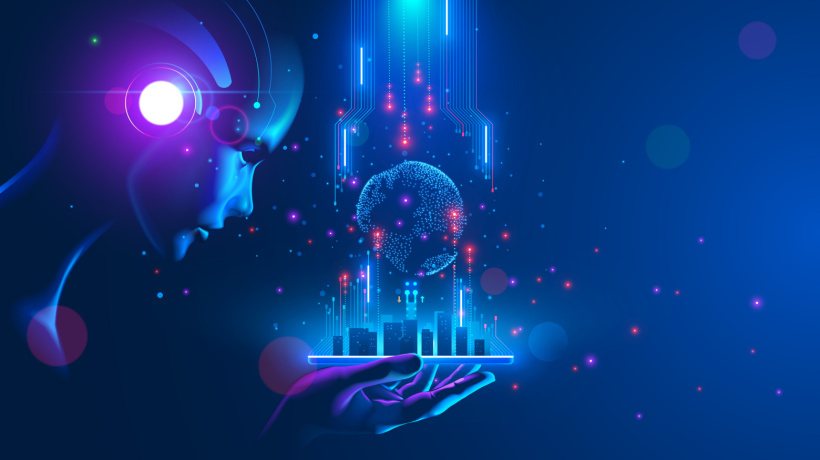Create New Content, Images, And Sounds In Seconds
As Artificial Intelligence (AI) increasingly impacts how we work, learn, and live, new improvements in AI have caught the headlines, including Chat GPT and other generative AI capabilities. While generative AI is still nascent, in this article we explore what it is, how it works, and how it can be leveraged in Learning and Development (L&D).
What Is Generative AI, And How Does It Work?
Generative AI is a type of machine learning that generates new outputs such as text, images, or sounds [1] based on the content it has been trained on. Generative AI works by using generative adversarial networks (GANs) [2], which are deep learning capabilities to create new content. GANs was created in 2014 by Ian Goodfellow and his colleagues to include two neural networks: a generator that creates new content and a discriminator that evaluates new content. The two neural networks operate on the basis of a zero-sum game, whereby the win of one neural network is the loss of another. The generator constantly tries to fool the discriminator, and the discriminator tries not to be fooled by the generator, and the two continue training on the new data generated. Some examples of generative AI include Chat GPT, which generates text; MidJourney, which generates images; Murf, which generates audio; and Codex, which generates new code.
Examples Of Generative AI
Chat GPT
Chat GPT is an open-source language-generating AI model developed by OpenAI. Chat GPT scours millions of pages of content, including articles, books, and Wikipedia, and produces, in seconds, text that is highly coherent and realistic. Chat GPT leverages deep learning, analyzing immense amounts of text data, learning the patterns, and mimicking the structure of natural language. This enables Chat GPT to generate realistic and expressive text when it is fine-tuned for specific tasks. Chat GPT works with a text input prompt whereby the human provides a prompt, and Chat GPT generates the content based on the prompt. To test this, I asked Chat GPT to write an article on the "Impact of Chat GPT on Learning and Development," which it delivered in seconds. Below is an excerpt from the conclusion of the article:
Chat GPT has the potential to revolutionize the field of learning and development. With its ability to provide personalized and on-demand learning, up-to-date and relevant information, improved efficiency, and increased accessibility, Chat GPT has the potential to transform the way we learn and develop new skills. However, it is important to carefully consider the challenges associated with the use of Chat GPT and to take appropriate measures to ensure the accuracy, reliability, privacy, and security of the information provided. As the field of learning and development continues to evolve and grow, it will be exciting to see how Chat GPT continues to shape and transform the field.
Clearly, the content is coherent and meaningful. However, Chat GPT is still a generative AI with limitations and biases; it often provides wrong answers, and it lacks context and nuance, so it is important to exercise caution when using it to generate learning content, images, and micro-learning modules.
MidJourney
MidJourney is a generative AI capability that generates new images following a prompt. For example, the prompts may be "group of diverse people working on a project together shot from above," "an image of a woman sitting at a computer," or "Santa Claus riding a bicycle." After receiving a prompt describing the image in natural language, it takes the Midjourney bot about a minute to generate four image options. Use cases of this capability include visuals for learning content, presentations, illustrations, and new creative imagery ideas.
Murf
Murf is a generative AI capability that generates studio-quality voiceovers in diverse people's voices in minutes. Such AI-generated voiceovers can be used in learning modules, presentations, and podcasts, among other assets. Murf allows the user to define the gender, accent, pitch, emphasis, and interjections of a voice. Using natural language in a prompt, the user can describe the voiceover they need from 120+ text-to-speech voices and more than 20 languages. Murf can be quite useful in generating voiceovers for uses in Learning and Development, including voiceovers for learning modules, presentations, websites, and HR onboarding videos.
Codex
Codex is a generative AI that can write code and can be used to create or tweak websites and write code for software development and technologies. Codex is proficient in more than twelve coding languages and can translate commands from natural language into code. This is quite powerful and useful in L&D as using a generative AI such as Codex can help instructional designers with the creation of learning experience landing website pages and micro-learning modules without requiring them to know how to code.
Conclusion
According to McKinsey [3], the relationship between humans and machines has been continuously optimizing since the Industrial Revolution over 150 years ago. There are three types of economic activity: production, transaction, and interaction. Machines and technologies in manufacturing have scaled production, and digitalization has improved transactions. Today, generative AI can impact interactions in a profound way by approximating human engagement, such as customer service and teaching. Generative AI can be powerful across many industries, including Learning and Development, where it can assist with generating learning content, images, and micro-modules.
References
[1] Top 35 Generative AI Tools by Category (Text, Image…) [2023]
[2] Generative adversarial network
[3] Generative AI is here: How tools like ChatGPT could change your business
